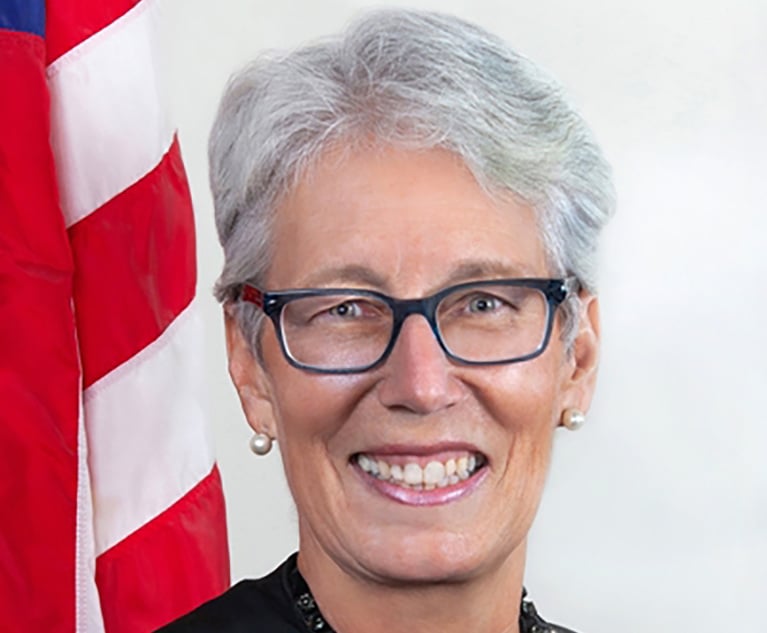 Chief Justice Leo E. Strine.
Chief Justice Leo E. Strine.Del. Justices Say DOJ Lawsuit Against SNAP Recipient Is Pre-empted
In a 34-page opinion, a full panel of the Delaware Department of Justice's lawsuit ran afoul of federal statute prohibiting states from launching consecutive administrative and civil actions against people who receive benefits through the Supplemental Nutrition Assistance Program, or SNAP.
March 12, 2019 at 06:39 PM
4 minute read
The original version of this story was published on Delaware Law Weekly
The Delaware Supreme Court on Tuesday blocked the state from pursuing a civil action seeking up to $375,000 from a woman who had bilked the federal government out of $6,100 in food benefits, ruling that the claims were pre-empted by federal law.
In a 34-page opinion, a full panel of the Delaware Department of Justice's lawsuit ran afoul of federal statute prohibiting states from launching consecutive administrative and civil actions against people who receive benefits through the Supplemental Nutrition Assistance Program, or SNAP.
Writing for the court, Chief Justice Leo E. Strine Jr. said the law required states to choose between either an administrative hearing or court actions in cases of intentional program violations. The state's case, he said, had instead tried to use factual findings from an already-completed hearing to build out a civil lawsuit where the “consequences are much starker.”
“For these reasons, we hold that federal law prohibits the State from bringing a civil action against a SNAP recipient after already bringing a successful administrative action against the recipient based on the same intentional program violations,” Strine wrote.
According to court documents, the state agency responsible for implementing the SNAP program in Delaware brought an administrative proceeding in 2017, which resulted in a $6,159 against Cindy Gonzalez for lying about her income and marital status while receiving SNAP benefits.
Gonzalez, who has started repaying the sum, declined to appeal and was banned from participating in SNAP for one year. Under federal law, 35 percent of the recovered federal funds would be remitted to the state.
The DOJ later brought its own civil case against Gonzalez under the Delaware False Claims and Reporting Act for restitution, treble damages and between $5,500 and $11,000 in statutory penalties for each violation—a total that tallied between $200,000 and $375,000.
Last July, Superior Court Resident Judge Richard R. Cooch ruled that the state was entitled to judgment on the pleadings.
On appeal, however, Gonzalez and her attorneys from Community Legal Aid Society Inc. and the National Center for Law and Economic Justice, argued the decision should be reversed on the basis of federal pre-emption, saying the state lacked the legal authority to pursue a civil case on top of the administrative hearing.
Attorneys for the DOJ countered that the federal statute applied to the Department of Health and Social Services, which oversees SNAP in Delaware, but not to the DOJ, which was free to pursue court actions.
In his ruling, Strine said the DOJ's “odd argument” ran contrary to the departments own practices and would allow any other state state with no legitimate role to proceed in “any way that other entity sees fit” against a recipient who might have improperly obtained federal benefits.
“We find it improbable that Congress intended for a summary administrative disqualification hearing—which should theoretically result in only a one-year disqualification and a few thousand dollars in liability—to bind a low-income individual in a later civil action that may result in a lifetime disqualification and hundreds of thousands of dollars in liability that won't be dischargeable in bankruptcy,” Strine said.
John S. Whitelaw, who represented Gonzalez, said the “state should pursue allegations of fraud, and it did” with the administrative hearing. However, he said, the DOJ's lawsuit against his client was far disproportionate to the wrongdoing.
“It was clearly meant to send a statement, and the impact to Ms. Gonzalez would have been horrendous,” said Whitelaw, advocacy director at CLASI.
“She was and is being significantly punished,” he said. “It's not that she's trying to avoid responsibility. It's that the relief sought by the state was draconian and excessive.”
A spokesman for the DOJ declined to comment.
Gonzalez was also represented by Travis W. England of the National Center for Law and Economic Justice.
Oliver J. Cleary of the DOJ argued the appeal on behalf of the state.
Whitelaw said the suit would likely now return to the Superior Court for arguments on whether the Supreme Court's ruling was dispositive to the case.
The lawsuit is captioned State v. Gonzalez.
This content has been archived. It is available through our partners, LexisNexis® and Bloomberg Law.
To view this content, please continue to their sites.
Not a Lexis Subscriber?
Subscribe Now
Not a Bloomberg Law Subscriber?
Subscribe Now
NOT FOR REPRINT
© 2024 ALM Global, LLC, All Rights Reserved. Request academic re-use from www.copyright.com. All other uses, submit a request to [email protected]. For more information visit Asset & Logo Licensing.
You Might Like
View All
Attorneys, Professors Share Support for Chancellor Following Musk's Online Attacks
4 minute read

Jurden Announces 2025 Retirement, Capping 24 Years on Superior Court
3 minute read
Trending Stories
- 13rd Circuit Strikes Down NLRB’s Monetary Remedies for Fired Starbucks Workers
- 2Latest Class of Court Officers Sworn into Service in New York
- 3Kirkland's Daniel Lavon-Krein: Staying Ahead of Private Equity Consolidation
- 4Many Southeast Law Firms Planned New, Smaller Offices in 2024
- 5On the Move and After Hours: Goldberg Segalla, Faegre Drinker, Pashman Stein
Who Got The Work
Michael G. Bongiorno, Andrew Scott Dulberg and Elizabeth E. Driscoll from Wilmer Cutler Pickering Hale and Dorr have stepped in to represent Symbotic Inc., an A.I.-enabled technology platform that focuses on increasing supply chain efficiency, and other defendants in a pending shareholder derivative lawsuit. The case, filed Oct. 2 in Massachusetts District Court by the Brown Law Firm on behalf of Stephen Austen, accuses certain officers and directors of misleading investors in regard to Symbotic's potential for margin growth by failing to disclose that the company was not equipped to timely deploy its systems or manage expenses through project delays. The case, assigned to U.S. District Judge Nathaniel M. Gorton, is 1:24-cv-12522, Austen v. Cohen et al.
Who Got The Work
Edmund Polubinski and Marie Killmond of Davis Polk & Wardwell have entered appearances for data platform software development company MongoDB and other defendants in a pending shareholder derivative lawsuit. The action, filed Oct. 7 in New York Southern District Court by the Brown Law Firm, accuses the company's directors and/or officers of falsely expressing confidence in the company’s restructuring of its sales incentive plan and downplaying the severity of decreases in its upfront commitments. The case is 1:24-cv-07594, Roy v. Ittycheria et al.
Who Got The Work
Amy O. Bruchs and Kurt F. Ellison of Michael Best & Friedrich have entered appearances for Epic Systems Corp. in a pending employment discrimination lawsuit. The suit was filed Sept. 7 in Wisconsin Western District Court by Levine Eisberner LLC and Siri & Glimstad on behalf of a project manager who claims that he was wrongfully terminated after applying for a religious exemption to the defendant's COVID-19 vaccine mandate. The case, assigned to U.S. Magistrate Judge Anita Marie Boor, is 3:24-cv-00630, Secker, Nathan v. Epic Systems Corporation.
Who Got The Work
David X. Sullivan, Thomas J. Finn and Gregory A. Hall from McCarter & English have entered appearances for Sunrun Installation Services in a pending civil rights lawsuit. The complaint was filed Sept. 4 in Connecticut District Court by attorney Robert M. Berke on behalf of former employee George Edward Steins, who was arrested and charged with employing an unregistered home improvement salesperson. The complaint alleges that had Sunrun informed the Connecticut Department of Consumer Protection that the plaintiff's employment had ended in 2017 and that he no longer held Sunrun's home improvement contractor license, he would not have been hit with charges, which were dismissed in May 2024. The case, assigned to U.S. District Judge Jeffrey A. Meyer, is 3:24-cv-01423, Steins v. Sunrun, Inc. et al.
Who Got The Work
Greenberg Traurig shareholder Joshua L. Raskin has entered an appearance for boohoo.com UK Ltd. in a pending patent infringement lawsuit. The suit, filed Sept. 3 in Texas Eastern District Court by Rozier Hardt McDonough on behalf of Alto Dynamics, asserts five patents related to an online shopping platform. The case, assigned to U.S. District Judge Rodney Gilstrap, is 2:24-cv-00719, Alto Dynamics, LLC v. boohoo.com UK Limited.
Featured Firms
Law Offices of Gary Martin Hays & Associates, P.C.
(470) 294-1674
Law Offices of Mark E. Salomone
(857) 444-6468
Smith & Hassler
(713) 739-1250






